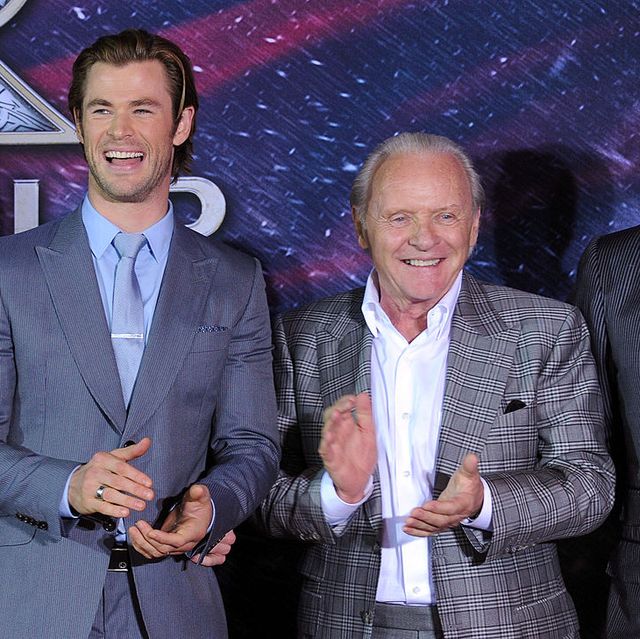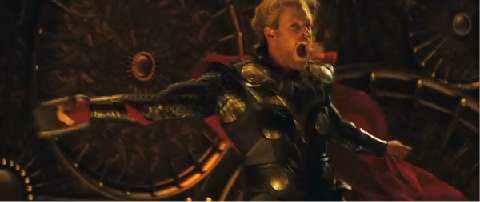Have you read the big New Yorker piece about the state of Marvel and the multiverse-distorting gravity its $29 billion box office has had on the centre of the cinema industry? Oh, you must. It's very good. It also contains an interesting little aside from Sir Anthony Hopkins, when the writer asked him about his time as Odin, father of Thor and Loki, in the first three Thor movies.
“They put me in armour; they shoved a beard on me,” Hopkins told the New Yorker. “Sit on the throne, shout a bit. If you’re sitting in front of a green screen, it’s pointless acting it.”
Which is exactly the kind of shrugging, bemused attitude which you assume a man who understudied Laurence Olivier at the National would have toward having to say things like, “You must think I'm a piece of bread, that needs to be buttered so heavily”. You can see how that would feel pointless, and you also half-suspect that something similar runs through the minds of most of the Hollywood grandees who’ve stuck their head through the flaps of Marvel’s tentpoles over the last decade and a half.
It’s one thing having Natalie Portman, or Tommy Lee Jones, or Samuel L Jackson in your movie. They’re all good gets. But Hopkins was Marvel’s first 24-carat megastar from a generation before superhero movies. Getting these big actors connected Marvel to the rest of the movie landscape. When Robert Redford followed him to give some proper Watergate-era froideur to the politicking in Captain America: The Winter Soldier, it felt like a flag being planted at the top of the cinematic mountain. The Avengers had already made Marvel the biggest game in town; now it had the clout to tempt a proper legend into being its bad guy. It had the same kind of jarring, exhilarating effect as when Manchester City signed Carlos Tevez: they can’t do that, can they? Surely?
(There are levels to these legendary actors, by the way. A good get and a surprise legend are very different things. There needs to be a level of 'hang-on-what?' about their announcement to make the highest grade. Kurt Russell, Dame Angela Bassett, Michael Douglas, Michael Keaton: surprise legends. Michelle Pfeiffer, Tilda Swinton, Jake Gyllenhaal: good gets. Hope that helps.)
Now the announcement of a genuine superstar from outwith the Marvel constellations is a critical part of any new movie: in the last couple of years Russell Crowe, Christian Bale and Angelina Jolie have done that mega-actor role.
There are good reasons why actors keep saying yes. The Disney cheques are big, and the promise of being plugged into the zeitgeist is hard to resist. “We try and stay current, and [Marvel have] got a winning formula,” Bassett told the New Yorker.
There’s also, perhaps, the slightly rueful acceptance that as big as any actor is now, they can’t open a film on their own anymore. That Very Big Actor role is now the equivalent of Glastonbury’s Sunday afternoon legends slot: they’re never going to headline the Pyramid Stage, but it’s good to see them having a nice time.
The latest big signing is Harrison Ford, who’s signed up to play Thaddeus Ross in Captain America: Brave New World and Thunderbolts. “I thought, 'Everybody else seems to be having a great time,’” Ford told the Hollywood Reporter in February. “I watch all these terrific actors having a good time… I’ll try a piece of that.”
Hmm. Now, I love Harrison Ford as much as anyone. He’s up there with Redford as a marquee name for Kevin Feige to metaphorically stand next to while they each hold one an end of a Marvel City FC scarf. But it feels a bit wrong. There’s something slightly bloated and decadent about it, the sense of turning up to a party with a fresh crate of beers at 4am as people are sneaking upstairs to bed.
When Marvel’s stock was only going up, there was an insurgent fun to the big names getting involved. Now it’s levelled off and they make up a giant chunk of the box office receipts of any given year, it feels a lot more transactional. I know Hopkins wasn’t doing Odin for the good of his health. Redford took home a few million dollars for The Winter Soldier. But matching up star and movie made both more exciting and interesting, and that’s the exact opposite of what’s happening now.
Marvel doesn’t need giant stars, and the fact of having Harrison Ford isn’t going to make a Harrison Ford-sized difference to the bottom line of Brave New World or Thunderbolts. What’s even more curious is that in Spider-Man: Across the Spider-Verse it has one of the hits of the year on its hands, and in that film’s wild innovation it also has a clear route out from here. It’s not weighed down with stars and the unbalancing effect they can have on a story – that, as much as any green screen and beard, is what threatens to make Marvel’s movies as pointless as Hopkins found them.













